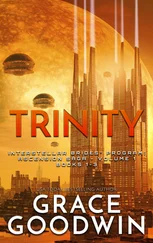Radnor turned back toward his radar screen. “Who protected her?” he asked vacantly.
Kazaklis choked back the tears again. The red walls closed in on him. He wanted out. Badly.
“I dunno, Radnor,” he said. Then he turned and slowly climbed the ladder back upstairs. It was only after he had returned to his seat, avoiding Moreau’s questioning look, that he realized that not even Halupalai had asked where they were going now.
He also realized that he hadn’t asked himself.
The lights were simply intolerable, so bright, one in each eye, that it took him a fuzzy moment to realize how cold he was. In the background he could hear a pervasive whine. Air-conditioning equipment? Operating-room equipment? Oh, Christ, they had him on the table again. He struggled to remember what it was this time. But he was so cold. He panicked. So this is the way it felt. An icy hand doth taketh. The fear chipped away at the mind fog. Dammit, he had the best doctors in the world. He fluttered his eyes and fought it. The operating-room lights were so strong, moon strobes that bored through his eyes, closed or open. He groaned and felt a hand on his arm. “Doctor?”
“It’s Sedgwick, sir,” a voice replied. “You’ve been out a very long time.”
“Sedgwick?” He didn’t have a doctor named Sedgwick.
“Hang tough, sir. You really got clobbered.”
The President strained to see the man talking to him, but saw only the lights. He heard a distant popping noise. Far off. Much farther off than the chaotic clatter during the race across the South Lawn. Sedgwick. Oh, Jesus. Sedgwick! He tried to pull himself up, and the pain speared through his legs. He felt Sedgwick gently restrain him. He fought through the pain to focus his eyes on the young military aide, but the piercing lights blotted out every thing.
“Where am I, Sedgwick?”
“I honest to God don’t know, sir,” Sedgwick answered apologetically. “Somewhere in Maryland. Not that far from the city. We’re down in some kind of gorge. You were very lucky.”
The President put his arm over his eyes. His mind felt rubbery, as it had toward the end in the White House, aboard the chopper. “The lights, Sedgwick,” he said desperately. “I don’t understand the lights.”
“Lights, sir?” Except for the small fire, and the far-off glow of the burning city, their encampment was quite dark.
“The lights, dammit!” The President groaned in pain.
“Both your legs are broken, Mr. President.”
The President moaned again.
“I believe you watched the detonation, sir,” Sedgwick said softly. “I believe you are blind.”
The President shivered, but not from the cold. He remembered the full moon. He remembered it blooming, bursting.
He remembered the rare beauty of it. Blind… He started to whimper and pull deeper under the blankets. Then, abruptly, he steeled himself. “How long have we been here, Sedgwick?”
“Five hours, Mr. President.”
“We’re near the city and it’s not destroyed?”
“It’s burning, sir. Took several small nukes, I believe. In and around the town. Andrews obviously. The Pentagon. I’m not sure what else.”
“But Washington’s not destroyed?”
“I don’t think so, sir. Or we’d be in more trouble out here.”
“You have to get me out of here, man. Do you understand?” The blurred words in the helicopter— after our response to their attack on the Chinese —now seemed tattooed in his brain, haunting in their new and awful clarity. “Do you understand how badly I screwed up?!” Then the blur began to return, the pain taking him again. “You must get me out…”
“I know, sir,” Sedgwick replied. “But I don’t know quite how, Mr. President. Both my legs are broken, too.”
• 1200 Zulu
In the good old days, six hours ago, a motorist on the ice-powder streets of Fairbanks could have spun his radio dial randomly and, if the crystalline currents of the winter atmosphere had flowed purely with his dreams, found himself wafted away ever so briefly by the siren strains of another world. The fickle radio waves would have teased him with the canary-soprano lure of the Orient, taken him for the most wonderful moment far from his cares and woes, and then without so much as a by-your-leave or a sayonara, dropped him off again in his own world, Yokohama gone, Fairbanks back, driving his Chevy to the levee and the levee was dry, the upper regions huzzing at him in playful am/fm mockery. Those were the good old days. Now, six hours after thousands of preternatural solar flares had shattered the crystalline carriers of man’s words and music, the mockery remained for those left to listen. But the playfulness was gone and capaciousness replaced it.
In the Looking Glass the chunky communications officer examined the data that told her something had gone awry over the Arctic Ocean. But she withheld it from Alice, reworking it instead, certain that the currents were playing tricks again.
In a small underground bunker in the farmlands near Olney, Maryland, a civil-defense technician despondently unzipped the heavy white suit he had worn outside to check his radio antennae. He showered to remove any lingering radiation, dressed hurriedly, and returned to his radio to send out his message again. The antennae, which he had propped up out of their concrete-and-copper silos after the EMP explosions, seemed to be working. But he received no reply.
In a much more elaborate bunker, south of the town of Cherepovets, a gray-uniformed cryptographer sweated furiously. His superiors were pushing him. But what was he to make of the garbled message he had intercepted from the outskirts of Washington? He assumed, rightly, that it had emerged from a tomb like his and merely acknowledged that men were there, as he was. He read the same data the Looking Glass woman had read and was equally suspicious—an American bomber had turned?—but he passed it along because the pressure was on. He had unscrambled part of a confusing conversation between two American command planes. It made no sense at all. He finally sent the mystifying code word off to his superiors, too. It was beyond his ken. Let them worry about anthropocide.
Inside Polar Bear One, heading in an unplanned and undefined southwesterly course across Alaska, the messages were mocking and capricious indeed. The music sounded tinny and hollow, and it came in dirges. It invaded helmets and souls alike, but it was not balm, not the siren strains of another world but the mournful gasp of a world departed. Suddenly the rigidly trained occupants of Polar Bear One had no world—neither the kamikaze world for which they had been programmed nor the world they had left behind. For the moment, none of them could cope with the latest change.
Downstairs, Radnor and Tyler withdrew still deeper into their isolation, even from each other. Upstairs, Halupalai, trying to make some sense of his latest failure, had rigged the radio once again for commercial broadcasts. That was a mistake. But Kazakhs, since his return from the tombs almost a half-hour ago, had retreated into silence. He grunted into the intercom just once. The grunt came when Halupalai, in spinning across the radio bands, landed on the cadenced monologue of a distant radio-pulpit preacher: There are three strata of the heavens… the first is the atmosphere… the second is the stars, and that refers to the planetary system where our solar system resides… the third is the abode of God, where we shall spend eternity… it is not heaven, for remember the Bible says heaven and earth shall both pass away… the abode of God cannot pass away… we will be taken there in the Rapture…. In this series we will study the timing of the Rapture… the Rapture… the Rapture….
Читать дальше












